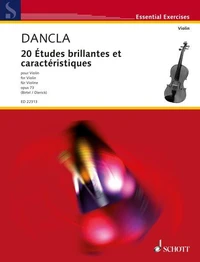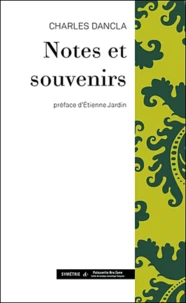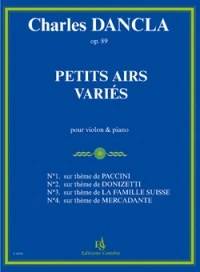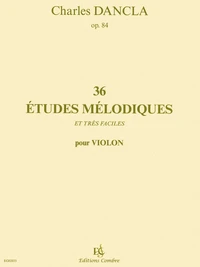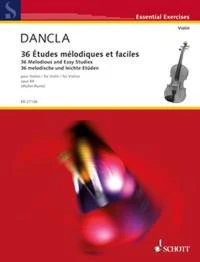Essential Exercises
36 Melodious and Easy Studies. op. 84. violin.
Par : Formats :
Disponible dans votre compte client Decitre ou Furet du Nord dès validation de votre commande. Le format PDF est :
- Compatible avec une lecture sur My Vivlio (smartphone, tablette, ordinateur)
- Compatible avec une lecture sur liseuses Vivlio
- Pour les liseuses autres que Vivlio, vous devez utiliser le logiciel Adobe Digital Edition. Non compatible avec la lecture sur les liseuses Kindle, Remarkable et Sony
 , qui est-ce ?
, qui est-ce ?Notre partenaire de plateforme de lecture numérique où vous retrouverez l'ensemble de vos ebooks gratuitement
Pour en savoir plus sur nos ebooks, consultez notre aide en ligne ici
- Nombre de pages52
- FormatPDF
- ISBN978-3-7957-2964-6
- EAN9783795729646
- Date de parution02/09/2021
- Protection num.Digital Watermarking
- Taille4 Mo
- Infos supplémentairespdf
- ÉditeurSchott Music
- EditeurMartin Müller-runte
- EditeurJulia Müller-runte
Résumé
Charles Dancla (1817-1907) is considered to be the last great representative of the French Violin School. He was a composer, solo violinist at the Paris Opera and professor at the Paris Conservatoire and wrote numerous educational works for violin, including his well-known three-volume work Little School of Melody'. He knew, in a unique way, how to implement the principle 'no music without technique, no technique without music' in his teaching material.
This is the case in his easy melodic studies Op. 84 which are available here in an arrangement for viola for the first time. These studies are perfectly suited for young beginners after the second year, but also for adult players, false beginners or those switching instruments. Most of them can be effectively used as little performance pieces, providing an excellent foundation for every advanced étude or concert piece. Each study is preceded by new or revised exercises which either deal with specific problems relating to the playing technique, like change of string, spiccato, martelé, chromaticism, change of position, octaves, or double stops, or present the tonal material of the respective study in a condensed, playful form.
Those who prefer Dancla's somewhat easier original preliminary exercises will find them in the appendix.
This is the case in his easy melodic studies Op. 84 which are available here in an arrangement for viola for the first time. These studies are perfectly suited for young beginners after the second year, but also for adult players, false beginners or those switching instruments. Most of them can be effectively used as little performance pieces, providing an excellent foundation for every advanced étude or concert piece. Each study is preceded by new or revised exercises which either deal with specific problems relating to the playing technique, like change of string, spiccato, martelé, chromaticism, change of position, octaves, or double stops, or present the tonal material of the respective study in a condensed, playful form.
Those who prefer Dancla's somewhat easier original preliminary exercises will find them in the appendix.
Charles Dancla (1817-1907) is considered to be the last great representative of the French Violin School. He was a composer, solo violinist at the Paris Opera and professor at the Paris Conservatoire and wrote numerous educational works for violin, including his well-known three-volume work Little School of Melody'. He knew, in a unique way, how to implement the principle 'no music without technique, no technique without music' in his teaching material.
This is the case in his easy melodic studies Op. 84 which are available here in an arrangement for viola for the first time. These studies are perfectly suited for young beginners after the second year, but also for adult players, false beginners or those switching instruments. Most of them can be effectively used as little performance pieces, providing an excellent foundation for every advanced étude or concert piece. Each study is preceded by new or revised exercises which either deal with specific problems relating to the playing technique, like change of string, spiccato, martelé, chromaticism, change of position, octaves, or double stops, or present the tonal material of the respective study in a condensed, playful form.
Those who prefer Dancla's somewhat easier original preliminary exercises will find them in the appendix.
This is the case in his easy melodic studies Op. 84 which are available here in an arrangement for viola for the first time. These studies are perfectly suited for young beginners after the second year, but also for adult players, false beginners or those switching instruments. Most of them can be effectively used as little performance pieces, providing an excellent foundation for every advanced étude or concert piece. Each study is preceded by new or revised exercises which either deal with specific problems relating to the playing technique, like change of string, spiccato, martelé, chromaticism, change of position, octaves, or double stops, or present the tonal material of the respective study in a condensed, playful form.
Those who prefer Dancla's somewhat easier original preliminary exercises will find them in the appendix.


